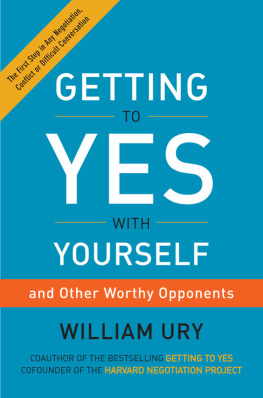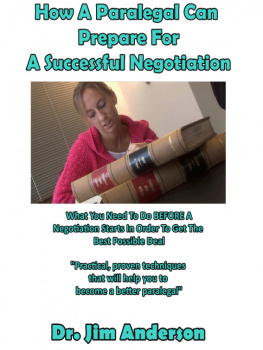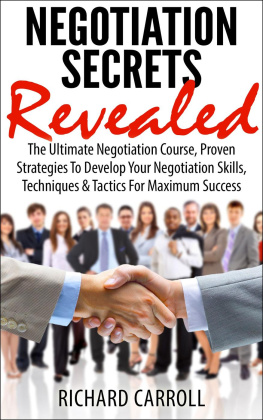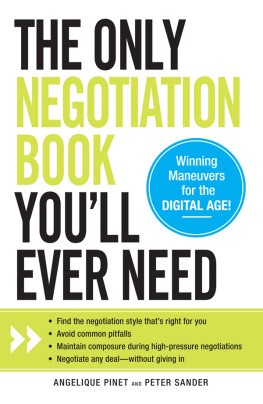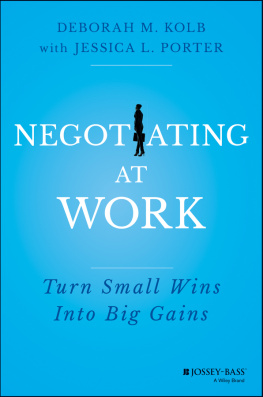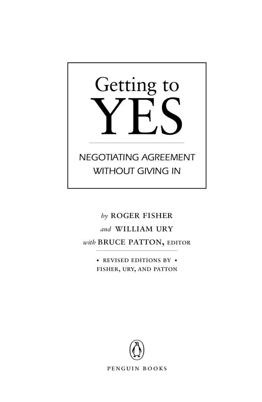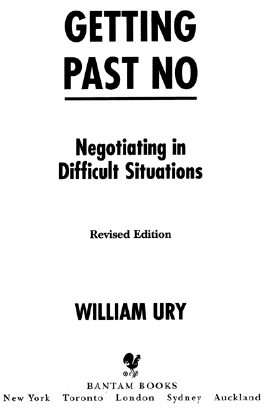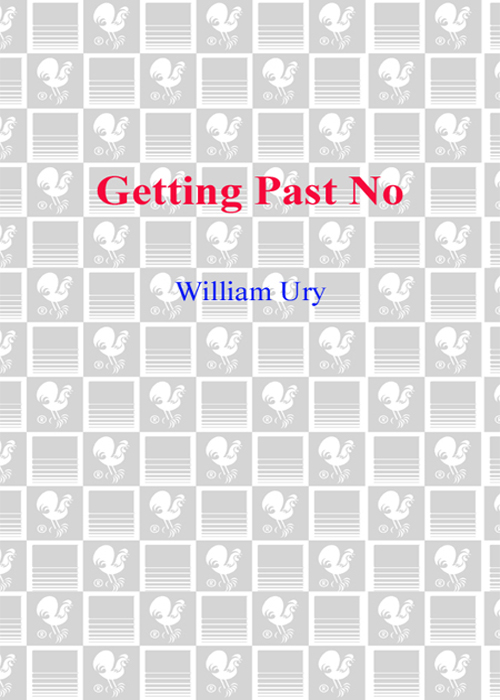
CONTENTS
For Roger Fisher
with gratitude
Authors Note, Fifteen Years Later
It has now been fifteen years since the publication of Getting Past No. Although the world has changed a good deal, the principles and methods presented here for dealing with difficult people and difficult situations remain as timely and needed as ever.
The importance and pervasiveness of negotiation have only continued to grow. A generation or so ago, it is fair to say that most decisions were made hierarchically. The people on the top gave the orders and the people on the bottom simply followed them. That is changing. Nowadays, in every domain, from family to work to politics, negotiation is becoming the preeminent form of making decisions. This is a global phenomenon I think of as the Negotiation Revolution.
But it is not easy to negotiate. If anything, there are more difficulties, disputes, and conflicts than ever in todays networked world. Conflict is a growth industryand so, naturally, are difficult negotiations. It is perhaps not surprising that the interest in the negotiating methods described here in Getting Past No has continued to grow.
I have often been asked how my thinking about negotiation has evolved in the time since I wrote Getting Past No. Although I would change little or nothing in this book, which has stood the test of time, I have just written a new book about negotiationcuriously enough, about how to say Noin a positive and constructive fashion. It may be useful therefore to say a word about the relationship, as I have come to understand it, among the three books I have written and co-written about negotiation, beginning with Getting to Yes.
Getting to Yes marks its twenty-fifth anniversary this month. Roger Fisher and I wrote it to address the challenge of adversarial conflict and the increasing need for cooperative negotiation at home, at work, and in the larger world. It continues to be found useful by a large readership around the world.
Ten years after the publication of Getting to Yes, I wrote Getting Past No in response to perhaps the most common question posed by readers of the first book: Sure, Id like to get to Yes, but what if the other sides answer is No? What if they dont want to cooperate? People want to know how to bring about cooperation and sustain it in the face of the seemingly insuperable obstacles we all face every day: attacks and counterattacks, anger and suspicion, ingrained habits of hard bargaining, interests that appear irreconcilable, and efforts to win through intimidation and power plays.
Getting Past No distills what I have learned over many years from my own experiences as a negotiator and mediator in a wide range of business, political, and interpersonal situations as well as from the systematic observation of successful negotiators in these different arenas. There are a multitude of useful techniques, but many of us find it hard to remember them in the midst of a heated negotiation. Therefore, I have tried in this book to organize what works into an all-purpose, five-step strategy called Breakthrough Negotiation. It represents my best answer to the question of how to win the cooperation of others in a world of strongly felt differences.
My latest book is The Power of a Positive No, subtitled How to Say No and Still Get to Yes. I have written it in response to another growth industrythe astronomical increase in the demands being made on each of us in this era of overload and overwork, ever-expanding e-mail, and eroding ethics.
Though one might at first think that Im working at cross purposes if Im teaching both how to say No and how to get past No, the truth is that the principles in The Power of a Positive No and Getting Past No are congruent and mutually reinforcing. They are also consistent with the principles in Getting to Yes.
Getting to Yes maps out the way to Yes, a mutually satisfactory agreement. Getting Past Nothis bookshows how to navigate the obstacles that stand betweeen you and Yes. For each of us encounters difficult people and difficult situations every day. The Power of a Positive No describes how to say No when it is vital to stand up and protect your core interests and values. It is not just about how to say No, however, but about how to do so in a respectful and constructive manner that can potentially lead to agreement. As its subtitle indicates, it is about how to say No and still get to Yes.
Ultimately, all of my books are about getting to Yes. Every one of us, many times a day, finds ourselves in the dance of negotiation, the dance of Yes and No. Sometimes we are in the role of the person saying No, and sometimes we are in the role of the person trying to get past No. Just as a great dance calls on both dancers to do their best, just as great sports games happen only when both teams play their best, so it is with negotiation. You get to the most satisfying solutions and the most optimal relationships when both sides are doing their best to engage the very real problems dividing them.
So, while each of the three books can stand alone, they are deeply complementary. I have come to see all three as a trilogy about the life skills necessary for successful negotiation. If each of us goes into negotiations with a good faith effort to get to Yes, and each of us learns how to say No when necessary and how to get past No when possible, our lives will be happier and more prosperous, and the world will be a better place.
Let me end by saying that it has been my pleasure to have used the simple five-step method described in Getting Past No and to have witnessed thousands of other people using it effectively for many years now. I wish you, the reader, much success in your own negotiations to come. May this method for getting past No truly serve you, those around you, and our larger world!
William Ury
Boulder, Colorado
September 2006
Acknowledgments
In working on successive drafts of this book, I often felt like the opera tenor whose finale was greeted with enthusiastic cries of Encore! Encore! After the fifth encore, the tenor asked the audience, How many more times do you want me to sing? And the answer came back: Until you get it right!
My audience has been equally demanding. I am immensely grateful for the comments and suggestions of those who read drafts, including Linda Antone, James Botkin, William Breslin, Nancy Buck, Stephen Goldberg, Richard Haass, Deborah Kolb, Linda Lane, David Lax, Martin Linsky, David Mitchell, Bruce Patton, John Pfeiffer, John Richardson, Carol Rinzler, Jeffrey Rubin, James Sebenius, Dayle Spencer, William Spencer, Daniel Stern, Douglas Stone, Elizabeth Ury, and Janice Ury.
I should also mention my enormous debt to the Program on Negotiation at Harvard Law School. Over more than a decade my colleagues there have provided me with intellectual stimulation and camaraderie. My ideas on negotiation have been forged and tested in the freewheeling seminars and conversations that take place under the Programs hospitable roof.
My colleague Roger Fisher introduced me to the field of negotiation over fifteen years ago and generously served as a mentor. Together we coauthored two books, the second being Getting to Yes. My debt to Roger is so great it can be properly acknowledged only on the dedication page.
Next page

